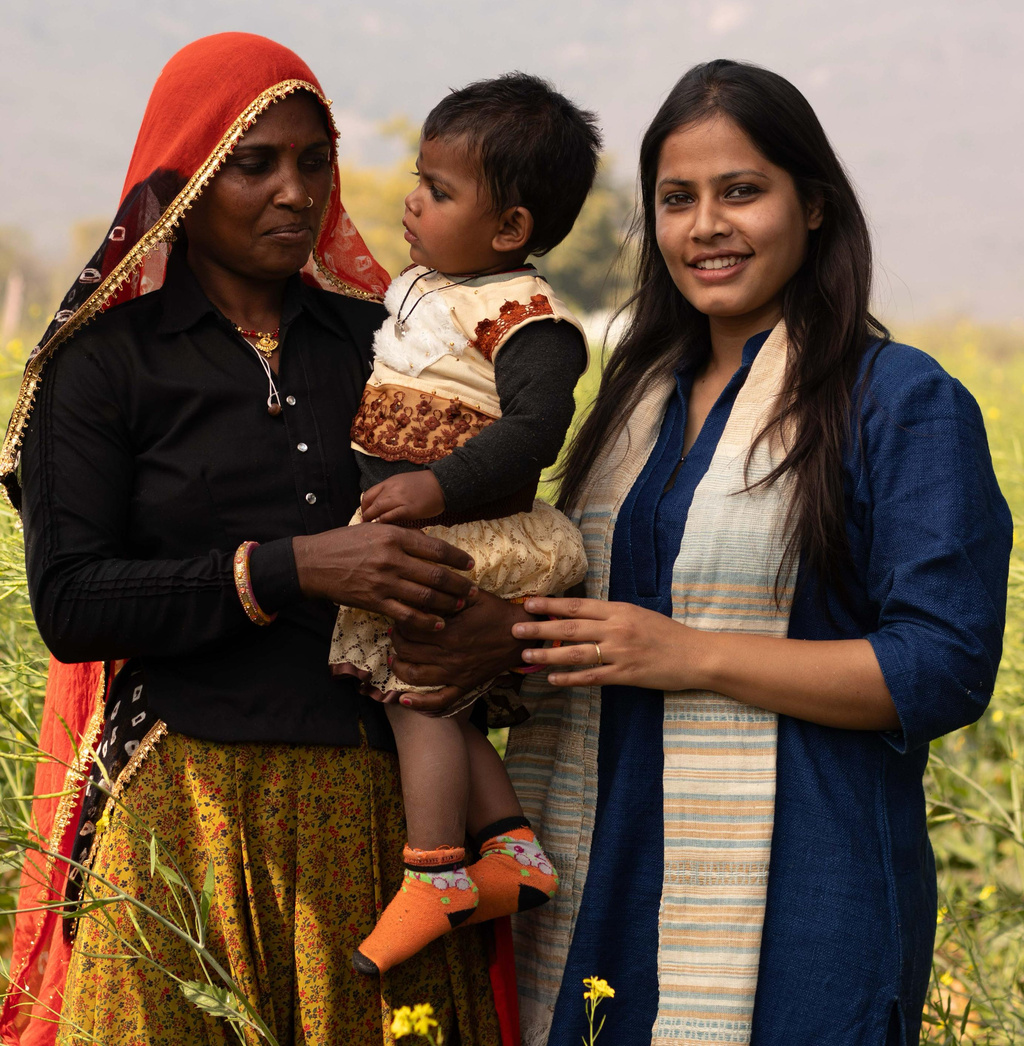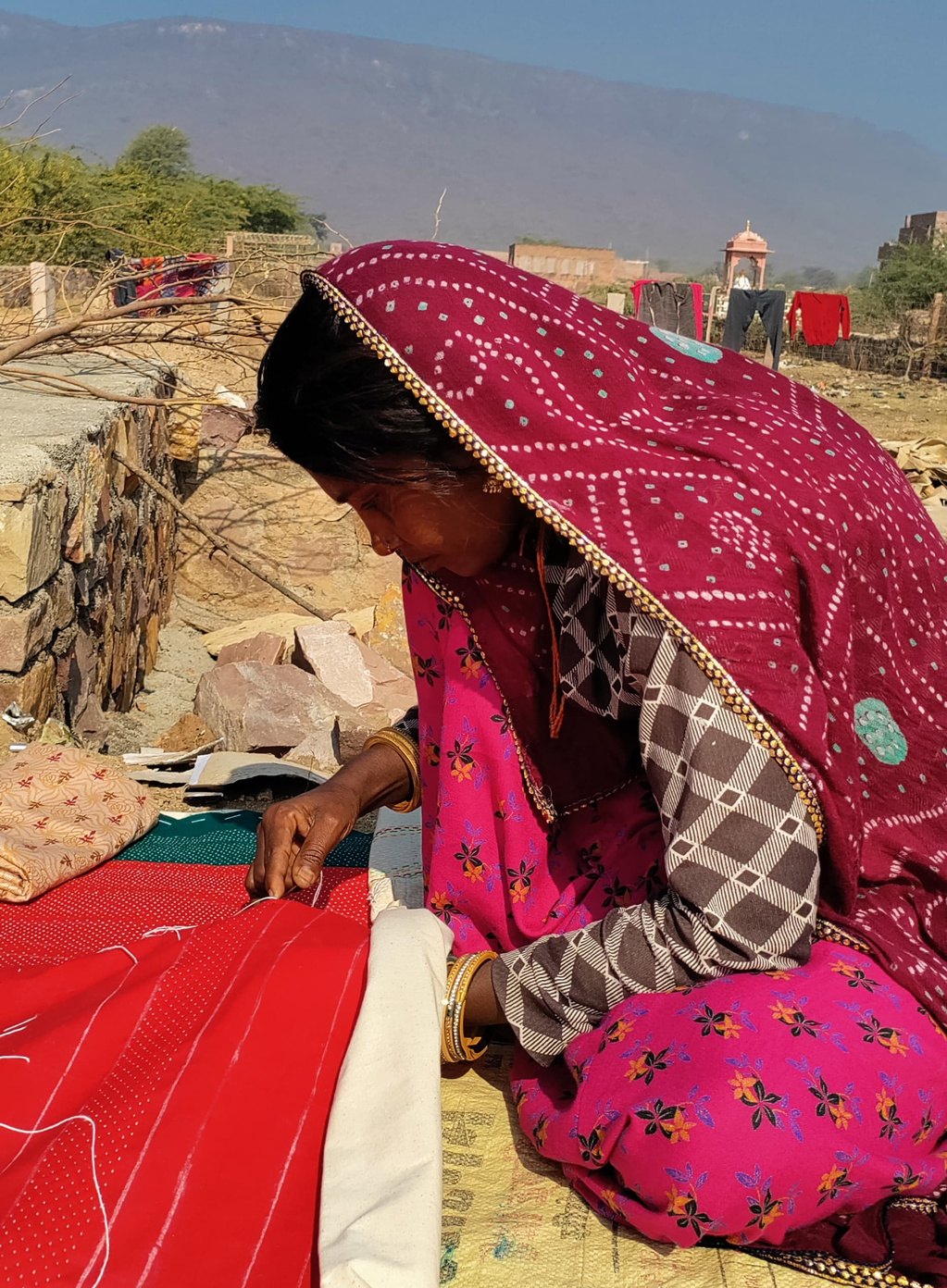Juhi Sharma reflects on her work with the Kalbelia community, denigrated as snake charmers, who have now regained dignity as artisans.
The sun was still gentle when I saw Lad crouched under the neem tree, her fingers moving with quiet certainty. A patch of faded fabric in her lap slowly began taking the shape of something meaningful — a quilt, yes, but more than that, a message. Her hands stitched stories the world had long overlooked.
Lad belongs to the Kalbelia community in Rajasthan, a group once branded by their history and reduced to a single identity: snake charmers. Their lives have long been shaped by invisibility: they have no land rights, no formal education, and no access to a stable income. Women like Lad, for generations, passed down knowledge through practice, not paper.
She learned quilting from her mother, who had learned it from hers, not in a classroom, but in the open courtyards of her village, where scraps of cloth were pieced together to mark births, marriages, and memories. These quilts weren’t made to be sold. They were made to remember. Before we met, Lad worked as a labourer on construction sites. During harvest season, she travelled miles for temporary farm work. It was hard, unstable, and unkind. There was no place for her art in that world.
Today, that has changed.
Through Vamika — the initiative I founded to centre the community’s knowledge and dignity — Lad now earns through her craft. She is no longer just surviving. She is creating. Her quilts carry the marks of her heritage and the weight of her hopes.
One quilt in particular changed everything.
She made it for the International Folk Art Market in Santa Fe, USA — one of the most prestigious platforms for handmade art in the world. I recall her saying to me, “The more beautifully we craft, the more recognition our community will receive.”
It wasn’t just a quilt. It was a declaration. Of skill. Of identity. Of presence.
But stepping into the world outside wasn’t easy.

I remember the day we were headed to Mumbai together for an exhibition. It was the first time Lad had left her village for such a long journey. On the train, her anxiety filled the air between us. “What will people think? Will they understand? Or will they see us the same way they always have?” she asked quietly. I took a moment and then told her gently,
“You are not what they say. You are a presence — a radiant aura, like me, like all of us. You’ve reached here through your own hard work, and it’s your art that speaks for you before the world.”
Something shifted in her.
Later, she told me, “I kept thinking how strange it is — people misunderstood us so much, kept us so far apart, that we became afraid to even show our own art.”
That’s when I knew: I wasn’t just walking with one woman. “I was walking with a history. With a future. I wasn’t building a brand. I was walking with purpose.”
Since that day, things have only continued to grow. Lad and other artisans from the Kalbelia community have presented their work at the Red Fort Indian Art, Architecture and Design Biennale, inaugurated by the Honourable Prime Minister of India. Their work has been featured in international publications like Selvedge Magazine in the UK. They have conducted workshops, taught students, and been celebrated not as subjects of pity but as bearers of knowledge.
Through Vamika, women from the community have found more than just work. They’ve found dignity. They are now earning, leading, and shaping their own futures. Girls are going back to school. For the first time, people are seeing them with respect, not prejudice. Their quilts tell stories, stitched with fabric and local wool, crafted with zero waste. The patterns speak of their land: cracked earth, sacred trees, and tribal geometry passed down through generations. They don’t chase trends. They preserve truth.
And now, the world is beginning to take notice, learning to walk beside them, not ahead of them. They had been pushed so far away from their own selves that fear gripped them even before they could express their art. It was my role to break that fear — to help them reclaim an identity that allows them to walk alongside us, with confidence and pride. This is the path I have chosen — not just for them, but for the entire community.”
About Juhi Sharma
 I’m the founder of Vamika — a designer and storyteller from Kota, Rajasthan, dedicated to preserving endangered crafts through meaningful collaboration with communities. Visit www.vamikastudio.com and follow @vamika.india.
I’m the founder of Vamika — a designer and storyteller from Kota, Rajasthan, dedicated to preserving endangered crafts through meaningful collaboration with communities. Visit www.vamikastudio.com and follow @vamika.india.


